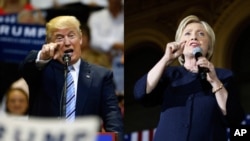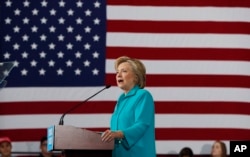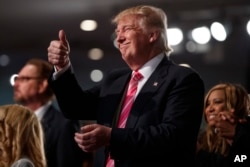Republican Donald Trump has edged closer to Democrat Hillary Clinton in U.S. presidential election public opinion polls, three weeks ahead of their first face-to-face debate.
Several U.S. polls show Clinton, a former U.S. secretary of state, ahead of Trump, a real estate mogul seeking his first elected office. But he has cut her lead to about four percentage points or less, about half the gap of a few weeks ago, even as she continues to narrowly lead in several battleground election states that likely will determine the outcome of the November 8 election.
Numerous U.S. political analysts are still predicting she will become the country's 45th president and its first female commander in chief, replacing U.S. President Barack Obama when he leaves office next January. But the analysts have narrowed the odds a bit in recent days.
The uncertainty of the race coincides with Monday's Labor Day holiday, the traditional point at which many families end their summer vacations, send their school-age children back to classes, and perhaps give new attention to the quadrennial presidential election. The first of three scheduled presidential debates is set for September 26, with the other two in October.
U.S. voters hold historically high unfavorable views of both candidates, with surveys showing that many of them are more inclined to vote against either Trump or Clinton rather than specifically favoring one over the other.
Both candidates have lobbed sharp verbal barbs at each other, hoping to win over undecided voters. Clinton has repeatedly said Trump lacks the temperament and knowledge to become president, while he points to what U.S. investigators say was her "extremely careless" handling of classified material on the unsecured, private email server she used while she was the country's top diplomat during Obama's first term from 2009 to 2013.
There was new attention to Clinton's handling of the emails Friday as the Federal Bureau of Investigation released an account of its probe and an hours-long interview with Clinton in which she could not recall on numerous occasions how she handled specific emails and did not know that a letter "C" designation meant it was classified. The FBI, over the protests of Republicans, in July decided Clinton's actions did not warrant criminal charges being filed against her.
Trump hired new top campaign aides to shape his populist message, but ended his flirtation last week with a softer line on immigration policies to attract more moderate voters opposed to the deportation of millions of undocumented immigrants living in the United States. He instead told cheering supporters, "There will be no legal status or becoming a citizen of the United States by illegally entering our country."
Trump, a one-time television reality show host, said that if he is elected, he would immediately deport several million undocumented immigrants convicted of crimes in the United States and start construction of a wall along the U.S.-Mexican border and force Mexico to pay for it. But he left unclear how he plans to deal with millions of other immigrants who have not committed any crimes other than entering the U.S. illegally.
Despite Clinton's narrowed national lead in the political polls, she continues to hold an edge over Trump in key states. U.S. presidential elections are not decided by a national popular vote, but rather in state-by-state contests, with each state's importance in the outcome weighted according to its population.
About 40 of the 50 U.S. states traditionally vote for Republican or Democratic U.S. presidential candidates, with the remaining states highly contested from one election to the next.
CBS News said Sunday its polling showed Clinton with an advantage in two battleground states, the eastern state of Pennsylvania by a 45-to-37 percent margin, and in the mid-Atlantic state of North Carolina, by a 46-42 edge. Clinton and Trump have campaigned in both states numerous times, with both realizing their importance to overall national outcome.






